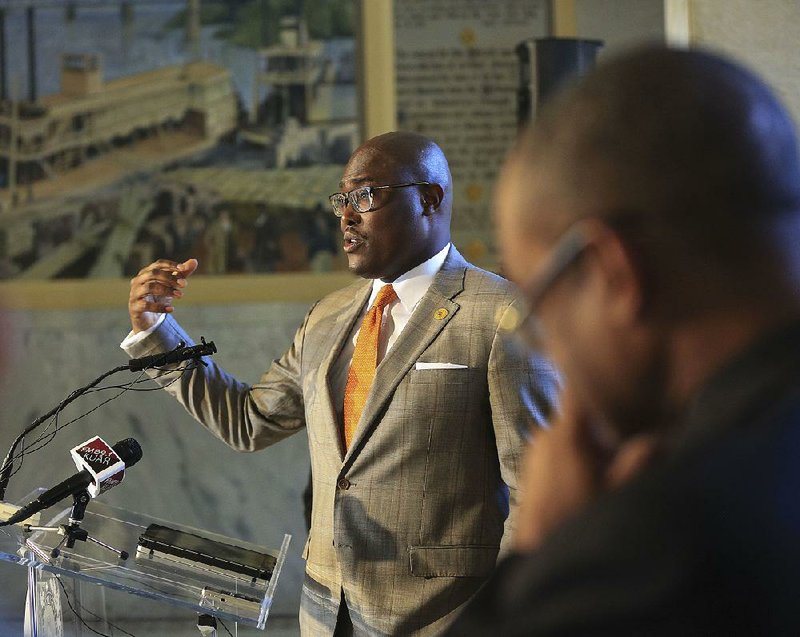Mayor Frank Scott Jr. announced on Monday a proposal to return the Little Rock School District to local control, which includes putting an interim school board in place in January 2020 and having the district operate its schools that received an F grade under a partnership between the city and the state.
Joined by other local leaders at a news conference Monday at City Hall, Scott asked the state Board of Education to adopt his proposal when it meets Thursday.
"This is a critical moment in our city and our state," Scott said.
Scott's announcement came weeks after the state outlined a path for returning the Little Rock School District to local control with limits in November 2020. The state's decision sparked fierce debate, with critics saying that a plan to keep schools with F grades under "different leadership" would make Little Rock schools separate but unequal, echoing their segregated past.
Under Scott's plan, a "transition board" would be in place until November 2020, when elections for a local school board are set to take place. The temporary board would make no "consequential decisions," Scott said when asked about what would happen to the Little Rock Education Association employee union, stressing that local control was the priority. State officials have taken steps to end collective bargaining in the district.
The interim board would be composed of "local community appointments" and members appointed by the state board, according to a news release from the city. Pressed for more detailed information on how appointments would be made, Scott said details were being worked out.
F-rated schools would be operated by the Little Rock School District under a memorandum of understanding with the Arkansas Department of Education and the city. Those schools would become known as "community schools" and would offer wraparound services to address poverty in those areas.
Scott also listed several ways the city will strengthen its partnership with the schools, which include hiring a "chief education officer" to coordinate partnerships with the district, providing "holistic care" from prenatal to age 5, free pre-K, out-of-school and summer enrichment programs, increased access to social and emotional learning and literacy initiatives and access to workforce development and skills training.
He said the city would "target" funds to support the Little Rock School District.
As of Monday evening, Scott's proposal was not on the agenda for the state board's meeting Thursday. Chairwoman Diane Zook said she didn't know if Scott had approached any members of the state Education Board to introduce his proposal as a substitute to the Education Board's already adopted framework for the school district.
Zook said it appeared to her that elements of Scott's proposal are already covered in the state Education Board's framework, with the exception of Scott's call for a "transition board."
"I see no need for a transition board when we already have the Community Advisory Board. Those are good, decent people," Zook said. "Those people have volunteered their time and worked tirelessly learning and becoming really familiar with the Little Rock School District for more than three years. To have a temporary board that would serve for less than a year, I see no point in that unless there is something I'm missing."
The seven-member Community Advisory Board was appointed by Education Secretary Johnny Key to advise him on personnel, policy and budget matters in the district before he makes final decisions. Key acts in place of a school board in the state-controlled district.
Zook said Scott's call for partnerships is addressed in the state Education Board's framework. She said she welcomes involvement from community partners to provide children with resources beyond academics.
"Nobody is denying that there are some kids who need more than just instruction in a classroom," she said. "It's just a matter of getting those partnerships going."
Scott said Monday he had spoken to Key and Gov. Asa Hutchinson, who he said were "very intrigued" by his ideas.
Kimberly Mundell, a spokesman for Key, said Monday afternoon that Key "has not reviewed the proposal, so there is no additional comment at this time."
In an emailed statement, Hutchinson said the city's support of the school district was good news.
"While the state has the ultimate responsibility under our Constitution, it takes many partners for a school district to be successful," the governor said in the statement. "I know the state Board of Education and the Department of Education will carefully evaluate the mayor's comments."
Five members of the Little Rock Board of Directors accompanied Scott at Monday's news conference; Scott said the other directors had prior commitments.
Ward 3's Kathy Webb said she was "totally on board" with Scott's comments. Webb, who is also a member of the city's Commission on Children, Youth and Families, said the commission would be supportive of programs that target schools in poor areas.
She added the proposal reminded her of an idea that Jay Barth, a former chairman of the state Board of Education, put forward at the time of the state takeover in January 2015.
The mayor and city directors were joined at City Hall by state Rep. Tippi McCullough, D-Little Rock; state Sen. Linda Chesterfield, D-Little Rock; and Arkansas Education Association President Carol Fleming.
McCullough said afterward that the mayor's plans were "not completely local control."
"It's not what we want as fast as we want it," she said.
The city of Little Rock and its school district have different boundaries and tax bases. Some campuses within city limits, such as Robinson middle and high schools, are in the Pulaski County Special School District.
But McCullough said that if the state board moves forward with its chosen framework, "it will show they haven't been listening."
The Education Board's meeting will start at 10 a.m. Thursday and will go into the afternoon. It is during the afternoon session that the board is scheduled to address the reconstituting of the capital city's school system -- including the possible grouping of schools into three categories -- and a proposal to end any further collective bargaining of Little Rock district employee contracts with the Little Rock Education Association employee union.
Specifically, the agenda item regarding the Little Rock district calls for consideration of the Every Student Succeeds Act School Index, school letter grades and school categories pursuant to the framework the board adopted Sept. 13.
The board's framework calls for three categories of Little Rock schools:
• Category 1 will be schools with a 2019 grade of D or higher, which will operate under a nine-member school board to be elected in November 2020.
• Category 2 will be schools undergoing reconfiguration as a result of the district's previously approved plan for closing, consolidating and repurposing schools to "right fit" the district for the system's decreased enrollment. Some of the F-graded schools are already in line to be closed after this school year.
• Category 3 schools are those with 2019 letter grades of F, which will operate under different leadership than the remaining schools in the district, "but in partnership with the district."
Mike Hernandez, the state superintendent for coordinated support services for academically or financially struggling school systems, will be the presenter of the Little Rock agenda item.
The board's agenda also includes recommendations on how personnel policy committees for both teachers and support staff would be organized should the employee union no longer be recognized as the contract bargaining agent for teachers and support staff.
A Section on 10/08/2019

